Political Science
Showing 1–10 of 14 results
-
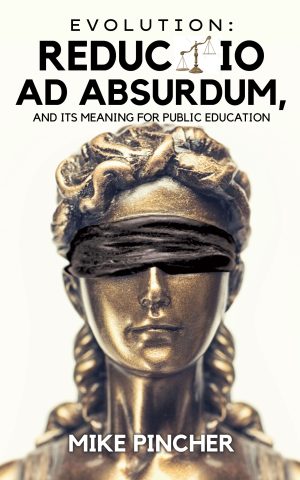
Evolution:Reductio Ad Absurdum, and Its Meaning For Public Education

Mike Pincher
About the Book
Thomas Jefferson proclaimed that if he had to choose between government and a free press, he would pick the latter. That is a compelling statement from the main architect of the Declaration of Independence and third President of the United States.This book blazes new trails in establishing that it is not only Constitutional to teach evolution and Intelligent Design side by side in the public schools, but that it is unconstitutional NOT to. Through the writings of Jefferson, Madison and Hamilton, and other historical evidence, it shows that our Founding Fathers considered the uncensored public dissemination of information the backbone of a free society. Its absence is tyranny, which now threatens us.
In so showing, Darwin’s evolutionary theory is exposed as deeply flawed both logically and scientifically, making its comparison to Intelligent Design necessary to fulfill the educational and secular purposes of presenting science in its fullest perspective.
About the Author
Mike Pincher is a civil trial lawyer in Palmdale, CA. Admitted to the California bar in 1977, he handles personal injuries and employment issues. He is also a part-time actor, having had speaking roles on TV soaps General Hospital, Days of Our Lives, Capitol, and Santa Barbara. -
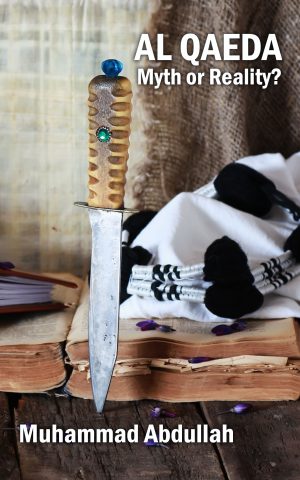
Al Qaeda
Myth or Reality?

Muhammad Abdullah
About the Book
Al Qaeda’s ideologies envision a complete break from the foreign influences in Muslim countries, and the creation of a new Islamic caliphate. Reported beliefs include that a Christian-Jewish alliance is conspiring to destroy Islam, which is largely embodied in the U.S.-Israel alliance, and that the killing of bystanders and civilians is religiously justified in jihad. Experts debate whether or not the Al-Qaeda attacks were blowbacks from the American CIA’s “Operation Cyclone” program to help the Afghan Mujahideen.About the Author
Muhammad Abdullah, author of this title, loves to help his city and the communities to develop and grow in positive ways. He has made genealogical researching and history compilation as his hobbies and special interests in hopes of tracing his family lineage. He has received community awards as a result of his active participation, and is currently a profile-motivated individual and team player of the community. He has been developing and implementing inner-city programs for the California Department of Corrections and Rehabilitation, California Youth Authority, and Bureau of Prisons. He is also a present lecturer and motivational speaker to the youth, writer, researcher, host, producer, and a consultant. He currently lives in Compton, California. -
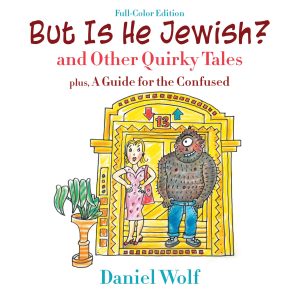
But Is He Jewish? and Other Quirky Tales (Full-Color Edition)

Daniel Wolf
About the Book
But Is He Jewish? is divided into three sections. The first section, “Quirky Tales,” consists of fifty short stories. Although each touches upon some aspect of Jewish life and culture, they deal with such universal themes as love, mortality, courage, coming of age, and the importance of family.The following section, “Mishegas” (Yiddish for craziness), includes stand-up comedy routines, the philosophical musings of a fictitious rabbi, advice for daily living (“A Guide for the Confused”), “Eighty Questions to Ponder,” and nonsensical poetry (“Quit”).
The final section, “Animals with Attitudes”, features four humorous mini-plays with animals (elephants, lions, housecats, and rhinoceroses) taking on Jewish characteristics and even speaking some Yiddish (translations provided).
In all, But Is He Jewish? provides a delightful reading experience, as it addresses a variety of topics in a mostly humorous but always human manner.
About the Author
Daniel Wolf was born and raised in Philadelphia, Pennsylvania. He retired from the Philadelphia Public School system in June 2015, having taught English as a Second Language for twenty-four years, primarily at the elementary level. In addition, from 1983 to 1993, he lived and taught English in Japan, during which time he traveled extensively both in Japan and throughout Asia.In addition to being a short-story writer, Mr. Wolf has composed five complete musicals (book, music, and lyrics) and has published five plays, all of which can be viewed at www.danielwolfmusic.com
He also performs stand-up comedy throughout the Philadelphia region. You can view his comedy routines and music videos on his YouTube channel: Daniel Wolf Music & Comedy. Other interests include chess, traditional Japanese archery (kyudo), cycling, nature walks, and exotic cuisine. He can be reached at [email protected]
-
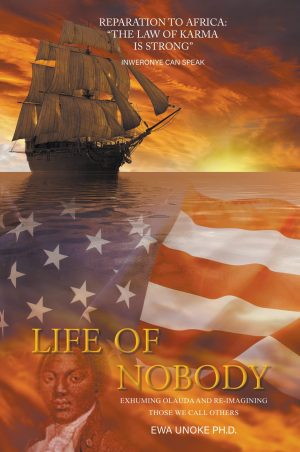
Life of Nobody

Ewa Unoke Ph.D.
About the Book
The African world has not healed from its traumatic past. The current clashes between black anger and white populism are symptoms of America’s long indifference to its national karma. Biden and Congress can pay reparation with a stroke of the pen. However, America has no Marshall Plan for Africa. Harriet Tubman is a heroic figure of the underground-railroad and the triumph of freedom. But nobody remembers Olauda Ikwueno who was kidnapped, enslaved and whose epic narrative abolished trans-Atlantic slave trade. In August 2019, Ewa Unoke, traveled to London to exhume and honor mkparawa Olauda – the freedom fighter and legend.About the Author
EWA UNOKE, Ph.D. Professor/Coordinator of Political Science, KCKCC Kansas City, Kansas.
2021 Ezeogo (King) Ezza Ezekuna Worldwide
2021 President, Henry Louis Center for Global Transitional Justice
2019 Henry Louis Excellence in Teaching Award
2019 Harriet Tubman “A Triumph of the Spirit” Freedom Award
2018 Ntsokara Unity Forum Excellence Award
2018 Legend of Diversity Award
Formerly Leader and child soldier, Biafran Organization of Freedom Fighter -

A Patriot’s Letters To AMERICA

Daniel Harmeson
About the Book
The essence of America that which really unites us, is not ethnicity, or nationality, or religion. It is an idea, and what an idea it is- that you can come from humble circumstances and do great things. That it doesn’t matter where you come from but where you are going.
Condoleeza Rice
“Ask not what your country can do for you, but what you can do for your country”.
John F. KennedyThese letters to America represent one side of the coin. Belief in small government. Belief in the 8,928 words of the Declaration of Independence, The Constitution and its 27 Amendments. Belief in the Right to pursue happiness. Belief in not relying on big government. Belief in freedoms/ liberties. Belief in America. Hopefully by reading these letters one will begin to, understand a differing value and the great love of this Republic. Or, reinforce that you are not alone in your beliefs. Through understanding, compromise, critical thinking and ownership for our actions, just maybe the great divide can begin to close.
About the Author
Dan is a retired 27 year veteran of the US Navy. Married to a loving wife, Zeny, for 39 years. Has two wonderful children and 4 loving grandchildren. His great love and gratitude to this Republic has inspired him to write letters to America.
Dedication:
Many thanks to my daughter, Charity for helping me get this project to publish. And to my wife who continues to inspire me through her great love of this Republic. Additionally, I owe a thanks to my youngest daughter, Christina, for reminding me there are two sides of the coin. Finally, I owe everything to America for giving me and my family the Right to pursue happiness. -
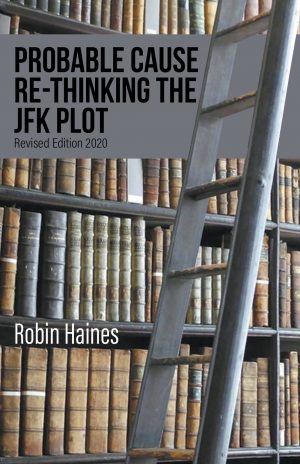
PROBABLE CAUSE RE-THINKING THE JFK PLOT

Robin Haines
About the Book
Was the JFK assassination the result of a random crime or a politically motivated conspiracy? Perhaps it was a legitimate covert intelligence operation of the US government. Could it be that JFK wasn’t murdered and his death was staged to appear to be a homicide? The author outlines a moral motive for the assassination and an explanation in the way the assassination was staged. The focus of this alternative theory revolves primarily around three men, whom she claims are the most important figures involved in planning and executing the death of JFK.
About the Author
Robin Haines was born in Jersey City, New Jersey, on March 20, 1953. Her mother was a journalist for a newspaper called the Hudson Dispatch, which later became the Jersey Journal Dispatch. She was a religion editor who also covered theatre and entertainment and occasionally covered stories about politics. Her father was a wine salesman who eventually became a cab driver. She graduated from Weehawken High School in June of 1972. She attended Manhattan School of Music and also to some extension courses at Julliard in theory and composition but did not obtain a degree.
-
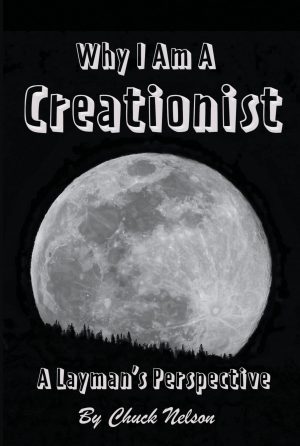
Why I Am a Creationist
A Layman’s Perspective

Chuck Nelson
About the Book
The subject of origins is one of humanity’s universal questions. The who, what, how, when, where and why issues surrounding origins are both intriguing and controversial. While cultural authorities in academia and the media push an entirely naturalistic evolutionary model of origins, the observations and experience of many people prevent them fully accepting such a model. Many people, scientist and laymen alike, see evidence of creation or design in the cosmos and in life itself. They see life as something more than chance and chemistry.
The author is neither a theologian nor a scientist but, as a layman, has studied the issue of origins for a number of years. In this layman to layman work, the author leads the reader through the maze of philosophical and scientific issues at play in the origins debate with the objective of affirming the belief in creation or design that so many hold.About the Author
The author grew up on a cattle ranch in Northern California ans is retired from a 34-year career in law enforcement. He has authored a book tittled, Life at The End of a Dirt Road”” giving an often-humorous account of growing up on a cattle ranch.
The author has a long-standing interest in photography which you are invited to enjoy at: www.chucknelsonphotography.com.
-
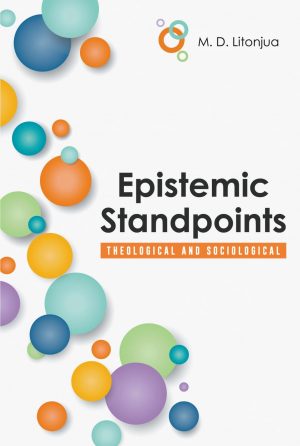
Epistemic Standpoints
Theological and Sociological

M. D. Litonjua
About the Book
Pilate asked “What is truth?” We too struggle with the question and we search for an answer. Correspondence theory told us that we grasp with our external senses objective reality, and the truth lies in the correspondence of the mind to external objective reality. The problem is that, except for basic mathematical equations, this explanation does not account for the diversity of opinions, the conflict of ideas, and the clash of ideologies. This does not include, of course, outright lies, denial of facts, manipulation of data, the malice of fake news.
We do not see things with the naked eye as they are. We see them from a certain perspective, from a specific point of view. A tree is not simply a tree. A tree provides restful shade to a weary traveler. It is useful lumber for the logger. It yields oxygen for a polluted atmosphere in the eyes of an environmentalist. It is an inspiration for a poem by Joyce Kilmer. In other words, it is foundationally a matter of, using a philosophical word, one’s epistemology. It involves one’s interests and concerns, it depends on what one considers important in life, the meaning he searches for in society and the world, how one conceives what life should be. We see, appreciate, judge from an epistemic standpoint.
The acknowledgement of different epistemic standpoints is the basis for dialogue, for the respectful discussion of differences of opinion, for the legitimate clash of ideologies. The acceptance of multiple standpoints is also the foundation for cooperation in spite of differences, for the search of common solutions to common problems, and for solidarity for the common good.About the Author
“M. D. Litonjua is emeritus professor of sociology at the Mount St. Joseph University in Cincinnati, OH. He holds a Ph.D. in Sociology from Brown University, an M.B.A. from the University of Missouri-St. Louis, and Licentiates in Philosophy and Theology from the University of Santo Tomas (Manila). -

Racist Bones in President Trump’s Body

M.P. PRABHAKARAN
About the Book
“Your pen is your biggest enemy” is the kind of warning M. P. Prabhakaran says he used to receive from his friends every time he published a provocative social or political commentary. He published them in The East-West Inquirer, an online monthly, of which he is editor and publisher. He has cited the warning in the preface to this book. The preface also says that, pointing to the subject of the commentary, those well-meaning friends would follow their warning with the question: “Why bother, if it doesn’t affect you in any way?”
In response, the preface goes on to say, Prabhakaran would throw the words, “Why bother, if it doesn’t affect you in any way?” back at them and then add: “History is full of examples of the disastrous consequences of this attitude.” He would remind his friends that the powers that be got away with the atrocious things they did because people were either too scared to speak up or the atrocious things did not affect them personally. To emphasize the point, Prabhakaran would draw their attention to the immortal words of the Lutheran pastor Martin Niemöller:
“When the Nazis arrested the Communists, I said nothing; after all, I was not a Communist….
When they arrested me, there was no longer anyone who could protest.” [The English translation is by Bob Berkovitz.]
This book is a collection of some of the articles published in The East-West Inquirer over the past two decades. The articles are Prabhakaran’s ways of speaking truth to power.About the Author
Most of his working life, M. P. Prabhakaran straddled two professions: journalism and teaching. He started his career in journalism, in 1969, as a cub reporter on Current, a weekly newspaper (now defunct) published from Bombay (now Mumbai).
He then moved on, as a sub-editor (called copy editor in the U.S.), to March of the Nation, another Bombay-based English weekly (also defunct now); and then to Free Press Journal, one of India’s leading English dailies.
After immigrating to the U.S. in 1975, he worked as the editor, first of The Voice of India, a monthly, and then of South Asia Newsspecial, a news and feature syndicate.
Side by side with his journalistic work, he also pursued a Ph.D. in Political Science, at The New School for Social Research, New York. After completing the Ph.D., in 1988, he taught for several years as an adjunct professor of political science, at the City University of New York. Teaching has always been Prabhakaran’s second love, the first being journalism. It started as a math teacher at a village high school in his native Indian State of Kerala.
Since 2001, he has been travelling extensively and posting his travel experience on The East-West Inquirer, an online monthly he started that year. The monthly, published at www.eastwestinquirer.com, also carries his social and political commentaries.
Prabhakaran has authored four other books: An Indian Goes Around the World – I: Capitalism Comes to Mao’s Mausoleum; An Indian Goes Around the World – II: What I Learned from My Thirty-Day European Odyssey; Letters on India The New York Times Did Not Publish, which is a collection of some of the letters he sent to The Times over three decades; and The Historical Origin of India’s Underdevelopment: A World-System Perspective, which is an expanded version of his doctoral dissertation.
M. P. Prabhakaran can be reached by email at [email protected] or [email protected].
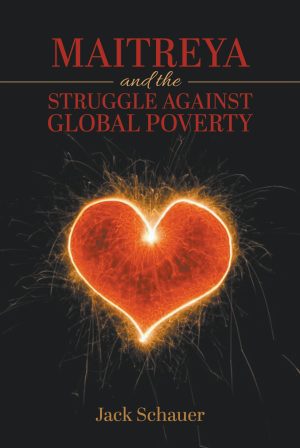
[email protected]
20-22 Wenlock Road, London N1 7GU +44-20-3656-5431
6065 Roswell Road, #450 Atlanta, GA 30328-4011 +1 855 515 1361
Payments made through this site are secure.